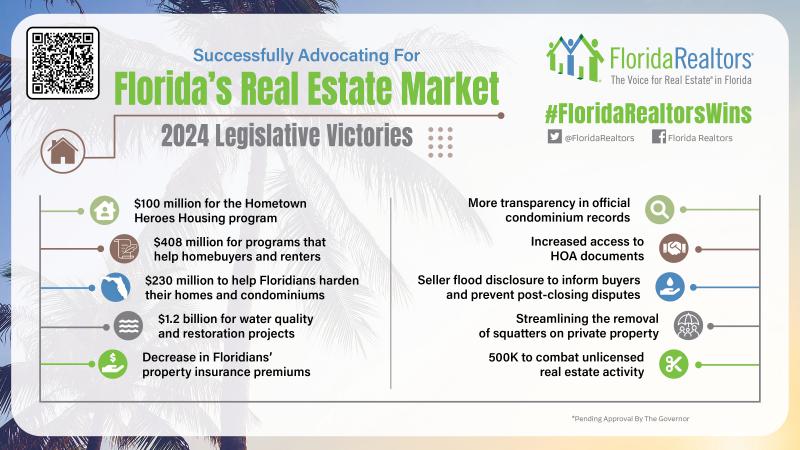 Florida Realtors PAC: Invest In Your Profession
Florida Realtors PAC: Invest In Your Profession
Florida Realtors Political Action Committee (FR-PAC)
In politics, money talks, and Florida Realtors PAC gives us a voice. When REALTORS® speak through Florida Realtors PAC, Tallahassee listens. And the more money Florida Realtors PAC raises, the louder we speak.
Many times, REALTORS® greatest victories receive no notice and little fanfare. An oppressive bill could die quietly in committee; an amendment that creates a tax on REALTOR® commissions could be unceremoniously pulled. The Florida Legislature introduces more than 4,000 bills each year. Florida Realtors® monitors each one and, when appropriate, works to influence the bill’s direction.
Florida Realtors PAC isn’t Republican; it isn’t Democrat; it doesn’t represent the independent voter; it doesn’t buy votes. It is simply a strong voice – and sometimes the only strong voice – fighting for Florida’s Realtors® and homeowners in Tallahassee.
Without Florida Realtors PAC, your voice in Tallahassee falls silent. Click here to learn more.
Why I Invest in RPAC
What’s the difference between RPAC and the Florida Realtors PAC?
Florida Realtors PAC is the branding name for Florida Realtors’ statewide political action committee efforts. RPAC represents the political efforts of the National Association of Realtors (NAR). With regard to the actual financials, Florida Realtors PAC and NAR’s RPAC are the same federated group with contributions being split among local, state and national associations. Every dollar is split in the following manner:
- 30% to NAR – RPAC
- 35% to Florida Realtors PAC
- 35% to local associations
A Look at the How Florida Realtors PAC Helps the Real Estate Industry
- Backing the Florida Realtors PAC gives you a voice in our state capital — and protects your business interests.
- In politics, money talks, and the Florida Realtors Political Action Committee (PAC) gives you a voice.
- When Realtors speak through your PAC, Tallahassee listens. And the more money the PAC raises, the more we are heard.
- The Florida Legislature introduces more than 4,000 bills every year. Florida Realtors monitors each one and, when appropriate, works to influence the bill’s direction.
Many times, Realtors’ greatest victories receive no notice and little fanfare. An oppressive bill could die quietly in committee; an amendment that creates a tax on Realtor commissions could be unceremoniously pulled.
Florida Realtors PAC isn’t Republican; it isn’t Democrat; it doesn’t represent the independent voter; it doesn’t buy votes. It is simply a strong voice — and sometimes the only strong voice — fighting in Tallahassee for our state's Realtors and homeowners.
Without Florida Realtors PAC, your voice in Tallahassee falls silent.
Are contributions to RPAC and the Florida Realtors PAC tax deductible?
Contributions used for political purposes are not tax deductible on federal income taxes.
Can I earmark money to a party or particular candidate?
Under federal election law, the earmarking of contributions is illegal.
2024 Legislative Victories

Affordable Housing & Homeownership
-
Hometown Heroes Housing Program (HHHP)
- An additional $100M was allocated to the HHHP, helping first-time homebuyers, especially frontline workers.
- Builds on the Live Local Act to encourage affordable housing development.
- Effective: July 1, 2024
-
State and Local Affordable Housing
- $408M allocated to housing trust funds:
- $174M for SHIP (downpayment and closing cost assistance).
- $234M for SAIL (affordable rental housing).
- Includes $150M in recurring funding from the 2023 Live Local Act.
- Effective: July 1, 2024
Property Insurance & Disaster Preparedness
-
Property Insurance Premium Relief
- HB 7073 mandates a 1.75% premium deduction for homestead property owners.
- Applies to policies active between October 1, 2024 – September 30, 2025.
-
My Safe Florida Home Program
- $200M allocated to help homeowners stormproof their homes and reduce insurance costs.
- A new $30M condominium pilot program will assist condos near the coast.
- Effective: July 1, 2024
-
Flood Disclosure Requirement
- HB 1049 requires sellers to provide written flood disclosures to buyers.
- Effective: October 1, 2024
Transparency & Consumer Protections
-
Condominium Transparency
- HB 1021 reduces the threshold for condo associations to post digital records (from 150 to 25 units).
- Includes financial reports, inspection records, and reserve studies.
- Effective: July 1, 2024
-
HOA Document Access
- HB 1203 requires HOAs with 100+ parcels to host records online by January 1, 2025.
-
Seller Protections Against Squatters
- HB 621 strengthens property owners' rights to remove unauthorized occupants.
- Effective: July 1, 2024
Environmental & Water Quality
- $1.2B for water quality initiatives, including:
- $581M for Everglades restoration.
- $75M for Indian River Lagoon.
- $135M for the Wastewater Grant Program.
Real Estate Industry-Specific Wins
-
Preventing Unlicensed Activity
- Up to $500K allocated to combat unlicensed real estate practices.
- Effective: July 1, 2024
-
Continuing Education for Licensees
- SB 382 preserves continuing education requirements, ensuring high professional standards.
-
Expedited Building Permits
- HB 267 creates programs to speed up residential building permit approvals.
Other Notable Wins
- Vacation Rental Regulation
- SB 280 preempts licensing to the state while allowing local governments to create registration programs.
- PACE Program Improvements
- SB 770 ensures better consumer protections for property improvement financing programs.
- Homestead Exemption Adjustment
- Proposed constitutional amendment to adjust the $25,000 homestead exemption annually for inflation.
For more details, visit Florida Realtors® Legislative Affairs.
Are you Registered to Vote in Florida?
Visit RegistertoVoteFlorida.gov to submit online a new registration or an update to your existing record, or to use the system to prepopulate, print, sign and mail in a paper application.
